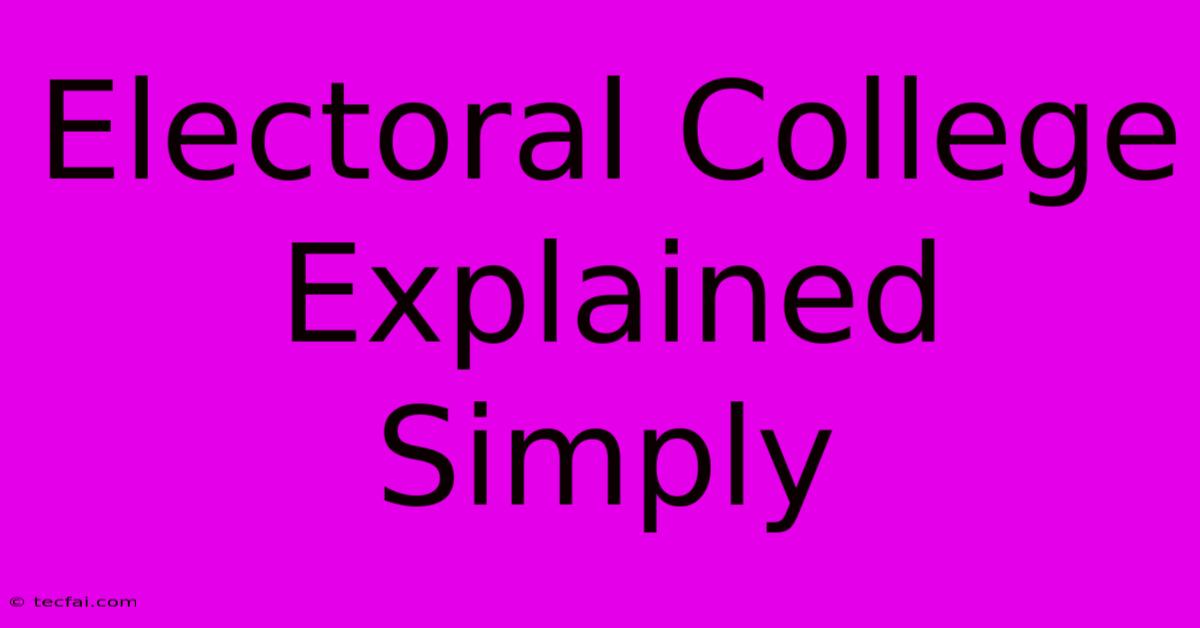Electoral College Explained Simply

Discover more detailed and exciting information on our website. Click the link below to start your adventure: Visit Best Website tecfai.com. Don't miss out!
Table of Contents
Electoral College Explained Simply: How the US President is Elected
The Electoral College, a unique feature of the US presidential election system, often sparks confusion and debate. While the popular vote might seem like the obvious way to choose a president, the Electoral College system adds another layer of complexity. In this article, we'll break down the Electoral College, explaining how it works and why it exists.
What is the Electoral College?
The Electoral College is a group of electors established by the United States Constitution, constituted every four years for the sole purpose of electing the President and Vice President of the United States. The electors are chosen by each state, and the number of electors for each state is equal to the number of seats the state has in the U.S. House of Representatives plus its two senators. This means that states with larger populations have more electors.
How Does the Electoral College Work?
-
The Popular Vote: When citizens vote in a presidential election, they are actually voting for a slate of electors pledged to a particular candidate. The candidate who wins the popular vote in a state typically wins all of that state's electoral votes (with the exception of Maine and Nebraska, which use a proportional system).
-
Electoral Votes: The total number of electoral votes is 538, representing the 100 senators, 435 members of the House of Representatives, and 3 electors for the District of Columbia.
-
The Winner: A candidate needs to secure 270 electoral votes to win the presidency. If no candidate reaches 270 votes, the election goes to the House of Representatives, where each state gets one vote.
Why Does the Electoral College Exist?
The Electoral College was established by the Founding Fathers for several reasons:
- Protection of Smaller States: The Electoral College system ensures that smaller states have a voice in presidential elections. Without it, candidates would only focus on winning the most populous states.
- Compromise Between Direct and Indirect Election: The Electoral College was a compromise between those who favored a direct election of the President and those who wanted an indirect election by state legislatures.
- Preventing Tyranny of the Majority: The system was intended to prevent a single candidate from winning the presidency based solely on the votes of a few large states.
Criticisms of the Electoral College
Despite its original intentions, the Electoral College has been criticized for several reasons:
- Possibility of a Candidate Winning Without the Popular Vote: The Electoral College system has allowed candidates to win the presidency without winning the popular vote, as seen in the 2000 and 2016 elections.
- Unfair Representation: Critics argue that the Electoral College system disproportionately favors certain states and gives less weight to the votes of individuals in those states.
- Discouragement of Voter Turnout: Some believe that the Electoral College can lead to a decrease in voter turnout in states that are considered "safe" for a particular candidate.
Conclusion
The Electoral College remains a complex and controversial system that continues to be debated. While it was designed to address concerns of the Founding Fathers, its continued relevance and fairness in the 21st century are hotly contested. Understanding the intricacies of the Electoral College is crucial for engaging in informed discussions about the future of US presidential elections.

Thank you for visiting our website wich cover about Electoral College Explained Simply. We hope the information provided has been useful to you. Feel free to contact us if you have any questions or need further assistance. See you next time and dont miss to bookmark.
Featured Posts
-
Understanding The Us Election News2 Day
Nov 05, 2024
-
All Mountain West Soccer Aggies Lead The Way
Nov 05, 2024
-
Latest Updates Volcanic Eruption In Indonesia
Nov 05, 2024
-
Green Posts 18 Points In Warriors Game Result
Nov 05, 2024
-
Trump Family A Comprehensive Guide
Nov 05, 2024
